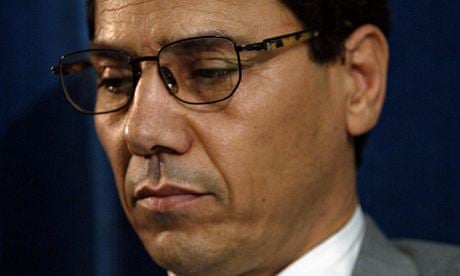Iranian guards and intelligence officials have used unprecedented levels of violence against political inmates in one of the country's most notorious prisons, opposition leaders claimed on Friday.
Kaleme, a news website close to an opposition leader, Mir Hossein Mousavi, has reported that dozens of prisoners were injured, some taken to hospital and others transferred to solitary confinement following disturbances in Evin prison in Tehran on Thursday.
Clashes between prisoners angry with their situation in jail and guards was said to have taken place in Evin's ward 350, where inmates with political charges are held. The guards wielded batons and used violence in an unprecedented fashion, opposition figures claimed.
"More than 30 prisoners were injured and at least four inmates were taken to a hospital outside the jail because they were bleeding or sustained fractures," reported Kaleme. "Thirty-two prisoners have also been transferred to solitary confinement."
On Fridaythe head of the country's state prisons, Gholam-Hossein Esmaeili, denied there were clashes in Evin, the semi-official Ilna news agency said. Reporters Without Borders said it had received information from sources in Iran that guards used "extreme violence, smashing TV sets, equipment and personal effects".
The non-profit organisation condemned what it called "grave violations of the rights of political prisoners" and called on the UN high commissioner for human rights, Navi Pillay, and the UN special rapporteur of human rights in Iran, Ahmed Shaheed, to investigate the incident and protect political prisoners.
Those beaten and held in solitary confinement include journalists and bloggers, including Mohammad Sadegh Kabovand, Hossein Ronaghi Malki, Mohammad Davari, Saeed Matinpour, Siamak Qaderi, Said Haeri and Yashar Darolshafa.
Human rights lawyers Abdolfattah Soltani and Hotain Dolati, and Behnam Ebrahimzadeh, an activist in the workers' movement, also among them, according to the Reporters Without Borders. Before the incident, prisoners were objecting about the nature of irregular inspections in Evin. They were handcuffed and blindfolded, Kaleme claimed.
Kaleme said one prisoner, identified as Omid Behroozi, had a vein ruptured. Esmail Barzegari's ribs were broken and Akbar Amini's skull fractured, it said.
"The violence used against these prisoners was gratuitous and cowardly, and was clearly designed to punish heroes who have continued to resist despite having suffered years of oppression," said Reporters Without Border's Reza Moini.
"This is also a warning to Iranian civil society, which keeps on demanding more freedom and democracy.
"The families of the detainees who have been placed in solitary have no news of them and are very worried. We share their concern and we call on the government to give firm guarantees that these prisoners of conscience will be protected."
Ali Motahari, a conservative member of the Iranian parliament who has spoken out about the situation of prisoners in the past, said he was concerned about the reports and would raise the issue with the justice minister.

Comments (…)
Sign in or create your Guardian account to join the discussion